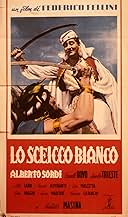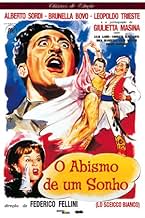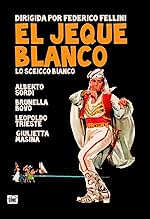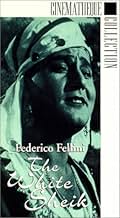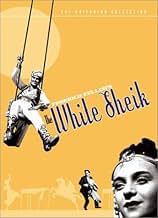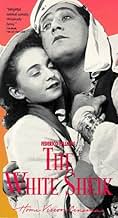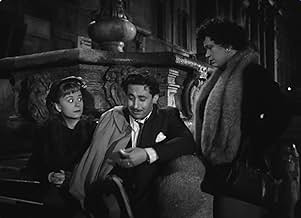IMDb RATING
7.2/10
7.3K
YOUR RATING
During a day of their honeymoon, newlyweds are separated by the city's lust and the desires it produces.During a day of their honeymoon, newlyweds are separated by the city's lust and the desires it produces.During a day of their honeymoon, newlyweds are separated by the city's lust and the desires it produces.
- Awards
- 1 nomination total
Aroldino the Comedian
- Cugino Aroldino
- (as Aroldino)
Featured reviews
...that Federico Fellini, one of the most gifted and visually wild Italian directors of the 20th century, blossomed out until with his masterpiece 8 1/2 (which, by the time he got to, as Martin Scorsese once said, "he was on Mars"). With his first solo effort, parting ways with Rossellini but not entirely from neo-realism, he went back to one of his passions- comic-book writing. Los Sciecco Bianco (The White Shiek) is likely one of Fellini's funniest works, and it shows him gearing up his visual sense of space, and with his trademark characters (set, which is his usual, in Rome).
The story is quite simple and, for the novice to Fellini's daring feats of the 60's, entertaining and accessible. A man with a level of pride in his family's connections in bureaucracy and religion in Rome (played by Leopoldo Triste, with perfect usage of wide eyes), is married to a young woman, Wanda (Brunella Bovo). She loves him, but finds him perhaps a little un-easy to be around for a day. So, she sneaks off for what she thinks is just a momentary call for fandom- she's a big fan of 'the white sheik', the star of the kinds of comics being printed in Italy (mostly for women, as said on the DVD, they were still photos as opposed to drawings, with pulp/love stories). But, in a Fellinian twist, Wanda gets whisked away by the shooting crew of the series, and Ivan (Triste) is stuck in one of those text-book comic situations, where everything is "under control". The results are rather funny, if also intriguing.
The little characters are also what makes the film fun, aside from our lead couple, and with this film we get the white sheik himself, Fernando Rivoli (Alberto Sordi, who finds that line between a stealthily romantic type and hopelessly dim), and the crew, filled with their little comments. Plus, there is a late-night visit to Ivan in a despairing state, from Cabiria (later to appear in one of Masina/Fellini's best combinations, Nights of Cabiria), involving a flame shooter. And as the film unravels, it becomes key to the fun- we know things will turn out right somehow, but how is what makes the film work (unlike Fellini, some might think, as many of his other films are the opposite, with flights of fantastical comedy in hopeless tragedies). It's not a great film, there are some inconsistencies, and at a couple of points the pace loses its strength. But if this was a place to evolve from for the director, it's not a bad place in the slightest. That there are wonderful turns for Trieste, Bovo, Marchio, and legendary composer Nina Rota, is another reason to watch it.
The story is quite simple and, for the novice to Fellini's daring feats of the 60's, entertaining and accessible. A man with a level of pride in his family's connections in bureaucracy and religion in Rome (played by Leopoldo Triste, with perfect usage of wide eyes), is married to a young woman, Wanda (Brunella Bovo). She loves him, but finds him perhaps a little un-easy to be around for a day. So, she sneaks off for what she thinks is just a momentary call for fandom- she's a big fan of 'the white sheik', the star of the kinds of comics being printed in Italy (mostly for women, as said on the DVD, they were still photos as opposed to drawings, with pulp/love stories). But, in a Fellinian twist, Wanda gets whisked away by the shooting crew of the series, and Ivan (Triste) is stuck in one of those text-book comic situations, where everything is "under control". The results are rather funny, if also intriguing.
The little characters are also what makes the film fun, aside from our lead couple, and with this film we get the white sheik himself, Fernando Rivoli (Alberto Sordi, who finds that line between a stealthily romantic type and hopelessly dim), and the crew, filled with their little comments. Plus, there is a late-night visit to Ivan in a despairing state, from Cabiria (later to appear in one of Masina/Fellini's best combinations, Nights of Cabiria), involving a flame shooter. And as the film unravels, it becomes key to the fun- we know things will turn out right somehow, but how is what makes the film work (unlike Fellini, some might think, as many of his other films are the opposite, with flights of fantastical comedy in hopeless tragedies). It's not a great film, there are some inconsistencies, and at a couple of points the pace loses its strength. But if this was a place to evolve from for the director, it's not a bad place in the slightest. That there are wonderful turns for Trieste, Bovo, Marchio, and legendary composer Nina Rota, is another reason to watch it.
A classic Fellini comedy, with all the atmosphere of a carnival that fans expect. Brunella Bovo is lovely, naive, well-meaning, but lead astray by a philandering playboy. Meanwhile, her new husband seems doomed to appear utterly insane to his family who has come to Rome to meet his blushing bride--suddenly disappeared. Charming, funny, what's not to love? Oh, and Guilietta Masina arrives in her role as the kind and sensual Cabiria--icing on the cake! While certainly not the greatest Fellini film on record, it makes for pleasant viewing. Yes, the behavior of the characters is hardly exemplary, but then, would that be entertaining?
Likable early Fellini told in a sprightly farcical vein, with good-natured jabs against hypocritical family honour, marital disharmony and the hokeyness of pulp kitsch.
The situations are a tad too low-key to work as premium farce, but the humanity and naturalness that are invested in the story and the characters, despite all tendencies to rely on stereotypes, render this pic highly watchable, if not as memorable as later films made by the master director.
And in an age when satire is often equated with a misanthropic attitude it's nice to witness a more empathic way to get one's knuckles rapped.
7 out of 10 pitying prostitutes
The situations are a tad too low-key to work as premium farce, but the humanity and naturalness that are invested in the story and the characters, despite all tendencies to rely on stereotypes, render this pic highly watchable, if not as memorable as later films made by the master director.
And in an age when satire is often equated with a misanthropic attitude it's nice to witness a more empathic way to get one's knuckles rapped.
7 out of 10 pitying prostitutes
10Ymir4
"Our real lives are in our dreams, but sometimes dreams are a fatal abyss."
That line above is one of the most beautiful lines I've ever heard in any film. This 1951 comedy feature is free of Fellini's quintessential surrealist vision but filled with the delights of idiosyncratic imagery, genius comical precision, and indisputable humanity.
The film opens in Rome, where a newlywed small-town couple is vacationing on their honeymoon. While in Rome, the (very) young bride takes advantage of being near the location where a new film is being shot that stars The White Sheik, a popular film/serial/newspaper icon whom she is secretly infatuated with. While her husband is sleeping, she sneaks off to find the Sheik and give him a drawing she has made of him. Brunella Bovo, who plays the bride, is new to me, but she was absolutely entrancing in her innocence. Trieste's comic expressions are absolutely arresting. Sordi is hilarious as the Sheik, who is about as unromantic a romantic figure as you can imagine.
Nino Rota's first score for Fellini is a lot of fun and exceptionally carnivalesque. You can tell by the marriage of music and image that Fellini and Rota had a real treasured creative hit-off with this film, and as most know, Rota scored every Fellini film after "White Sheik" until his death in 1979. This great score has never been released in it's entirety, but the main title theme has appeared on many Rota compilations.
An absolutely adorable little film, which seems to have been regrettably ignored by the majority. It's one I will watch many times.
That line above is one of the most beautiful lines I've ever heard in any film. This 1951 comedy feature is free of Fellini's quintessential surrealist vision but filled with the delights of idiosyncratic imagery, genius comical precision, and indisputable humanity.
The film opens in Rome, where a newlywed small-town couple is vacationing on their honeymoon. While in Rome, the (very) young bride takes advantage of being near the location where a new film is being shot that stars The White Sheik, a popular film/serial/newspaper icon whom she is secretly infatuated with. While her husband is sleeping, she sneaks off to find the Sheik and give him a drawing she has made of him. Brunella Bovo, who plays the bride, is new to me, but she was absolutely entrancing in her innocence. Trieste's comic expressions are absolutely arresting. Sordi is hilarious as the Sheik, who is about as unromantic a romantic figure as you can imagine.
Nino Rota's first score for Fellini is a lot of fun and exceptionally carnivalesque. You can tell by the marriage of music and image that Fellini and Rota had a real treasured creative hit-off with this film, and as most know, Rota scored every Fellini film after "White Sheik" until his death in 1979. This great score has never been released in it's entirety, but the main title theme has appeared on many Rota compilations.
An absolutely adorable little film, which seems to have been regrettably ignored by the majority. It's one I will watch many times.
9sol-
Quite an interesting comedy with ideas about fantasy versus reality, a wonderful Nino Rota score, and great work by Bovo, an actress who can capture some great expressions on her face: realistically big-eyed, naïve and innocent, as is required for her character. The film does however suffer from unevenness, trying to balance two styles of comedy - light-hearted semi fantasy and silly slapstick. By themselves either style works fine, but when joined together, it becomes a little messy. The film is not really helped by excessively silly supporting characters, and Trieste feels very over-the-top at times. Still, the aforementioned virtues, and interesting camera-work with an extensive range of different angles, are enough to keep this film afloat. Definitely recommended, even if not perfect.
Did you know
- TriviaThe character Cabiria later returns in Nights of Cabiria (1957). Giulietta Masina's short role in this film inspired Fellini to write a screenplay with Giulietta as the main character.
- Quotes
Ivan Cavalli: Now, my dear, if you don't mind, I'd like to remove my jacket.
- ConnectionsFeatured in Stairs (1986)
- How long is The White Sheik?Powered by Alexa
Details
Box office
- Gross US & Canada
- $50,850
- Opening weekend US & Canada
- $5,562
- Dec 29, 2019
- Gross worldwide
- $70,699
- Runtime
- 1h 23m(83 min)
- Color
- Sound mix
- Aspect ratio
- 1.37 : 1
Contribute to this page
Suggest an edit or add missing content



